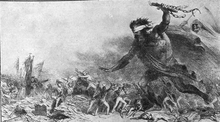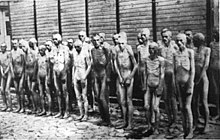User:Herzen/Russophobia
'Russophobia' (also, Russians hostility or Antirussismus
There are a variety of stereotypes about Russia and Russians who set up partly to justified criticism, partly on prejudice [2] and as elements in political confrontation against the Soviet Union and the Russia are used [3] arguments against Russophobia are widespread in Russia in right-wing circles, be used against democratic reform efforts and serve sometimes to construct myths about the fall of the Soviet Union. [4]
The history of the connections between Russia and Western Europe [5] and the successful integration of Western Europe, in the USA and emigrated to Israel Russians suggests that there is no general Russophobia [6] the phenomenon of negative image Russia s has 500 years of tradition in the opinion of individual authors in recent times partly unnecessary false [7] or Russian national perspective to an "ideology" developed. [8]
It has also asked the question, "if not our image of Russia usually arises as a function of how Russia itself estimates ... Both types of images - external and self-images -. Have influenced the course of history of our mutual perceptions and relationships you are so far an idea provoked in a kind of symbiosis another ... What is sometimes hidden in these images of prejudice and what they can be used, has sometimes had terrible consequences. "[9]
History
Middle Ages and Early Modern Times
First negative portrayals of Russians date back to the 13th century in connection with the struggle of the
At the turn of the 16th century intensified
In connection with the Livonian War European travelers to Russia reported on the tyranny of the Russian Tsar Ivan "the Terrible" (correct translation: the Dread), whereby the image of a highly repressive Russian domination spread. The Oprichnina was directed against the old princely families at the beginning. Later the direction of the repressive policy was expanded to counter new threats. Ruslan G. Skrynnikov compiled an account with a list of names of those executed by the Synodikon Ivan Groznyjs. [11]
Last time until the 19th century

Anti-Russian views were widespread in France in the 19th century. While the European intellectuals had overall a positive view of Russia,
In
While European Conservatives tend to see Russia as the "savior of Europe" and the stronghold of legitimate monarchy and preserver of Christian faith tradition in the first half of the 19th century, Russia is often depicted as the "Gendarme of Europe" by liberal, the notion adopted and disseminated by left revolutionary circles, including by Karl Marx and Friedrich Engels.[19] Numerous pamphlets by exiled Poles appear, in which the "uncultured" Russians are described as being of an Asian-Turanian origin . [20]
The fear of the
20th century
At the beginning of the 20th & nbsp; century France and England approached politically again Russia, whereas the relations
The

A
In
Especially in the era of
Germany
They criticize the Russia reporting in Germany is partly or mainly of a negative attitude and lack of sophistication [29][30] marked. Difficulties and misunderstandings in the correspondent activities are added. [31] In particular, the focus on Vladimir Putin Russia and the political crises in the Western media to draw some commentators a distorted picture of the actual conditions in Russland.[32][33]
Starting points of Russophobia
Russophobe ideas consist in part of a long term consistent negative thought [10]. Key policy approaches for fundamental Russia criticism based on an alleged inability to self-government and a resulting tyrannical form of government, or the people are "blind to the power of absolute power of the ruler" subordinating [10]. This is often brought also with an alleged Russian imperialism and the Russian Orthodox Church as a "religion of slaves" in connection.
Theory of Russophobia as an ideology by Oleg Nemenski
The concept of Russophobia was an integral part of the ideology Russian nationalists [34] The Russian historian Oleg Nemenski has a theory of Russophobia as ideology developed. Similar to some of the classic Normannismus the German historian of the 18th century with respect to the establishment of the Russian state or launched by Marquis de Custine conception of Russia as a "prison of the people", according to this theory founded the present Western political science and journalism, which tend to the presence of a free public opinion in Russia to deny and to attribute the view taken by the Russian majority positions of state propaganda. Traditionally, such approaches lead to inappropriate conclusions and lower prediction quality of the events in Russia [8]. Everything specifically Russian would be perceived as hostile to freedom. This would affect not only the "despotic" political power, but also the Russian Orthodox Church and Russian Orthodoxy as the "religion of slaves." The juxtaposition of "Western freedom" and the "Russian slavery" have experienced different forms in different eras. After the formation of nation-states, the Russians would be represented as a carrier of the imperial body of thought as enemies of the free National, while they are at the juxtaposition of neoliberal globalism and national sovereignty, conversely, as a carrier of the "backward" National.
However, since the era of the nation-state has not yet passed, dominated the idea of Russians as "eternal imperialists". Neighboring peoples, the Russians were under the "Russian Knute". Since absolute power by definition, qualitative and quantitative growth, ie must strive expansion, the Russians would be understood as "slavish people" as a tool in this endeavor. This was closely intertwined the conviction that the Russians sought after the conquest of Europe and not diminishing fear of Western man in front of a Russian invasion ("The Russians are coming!"). Any freedom would object as a potential destruction of the Russian tyrants and the freedom hating Russians viewed.

The attempts to explain such a striking "otherness" of the Russians usually two reasoning strategies were observed: historically and genetically. According to the first, the Russian culture of tyranny and slavery as a combination of two main sources is limited, the Byzantine orthodoxy and the Tartar despotism. After a developed historical conception was claimed that Russia has inherited the Golden Horde, by having taken over the main characteristics of the political culture of the nomadic structure. Russia and the Golden Horde was the typical stereotype Russophobe, both in historical essays, as well as in journalism.
Often enough, however, it would apply to statements that make a particular genetic tendency of Russians to unfreedom responsible. Accordingly, the Russians tolerate the tyranny, because they are naturally disposed to do so. After this representation, the Russians are not just a backward people, but as genetically inferior and incapable of receiving the Western values. Numerous journalists alleged in the course of history, the Russian genetics was corrupted by the historical experiences of the people: bondage, war, repression, revolution, etc. Experimental results of such a perception were felt not only in World War II, but certainly also today. Thrust of the US attorneys who specialize in deaths of Russian adopted children in American families, often based on the supposedly special genetic inclinations of the Russians [8].
See also
Literature
- Gabriela Lehmann-Carli, Yvonne Drosihn, Ulrike sweatshop-Sowitzki, Hilmar Preuss: Russia between East and West Poised ?: national identity . Frank & Timme, Berlin 2010, ISBN 978-3-86596-338-3.
External links
- Germany radio: Double standards? The coverage of Russia and the USA , 1 March-2013.
- Heise online, 7th Januar of 2009.
- Jutta Scherrer: Russia Pictures in Europe - Voices from France, Germany and Poland. Meeting in gene Hagen / Brandenburg 1.-2. Dec. 2006 [11]
References
- ^ See Heinz Gollwitzer:. From the Age of Discovery to the beginning of imperialism V & R, 1972, p. 372nd
- ^ Jonathan Steel: The west's new Russophobia is hypocritical - and wrong . In: the guardian of 30 June 2006 [1]
- ^ Johnson Forest:. Till. Post-totalitarian national identity: public memory in Germany and Russia . In: Social & Cultural Geography. . Vol. 5, no. 3, September 2004
- ^ Robert Horvath: The legacy of Soviet dissent: dissidents, Democratisation and radical nationalism in Russia . Psychology Press, 2005. p 262
- Lew Kopelew Wuppertal research project [2]. As part of a project of Deutsche Forschungsgemeinschaft the West-Eastern reflections were digitized in full and are available through the Bavarian Staatsbibkliothek available: [3].
- ^ digression into history. Russians abroad /morenews.php?iditem=5937
- ^ a b Andrei Tsygankov , Russophobia: Anti-Russian Lobby and American Foreign Policy. Palgrave, 2009
- ^ a b c d Oleg Nemenski. Russophobia as an ideology // issues of nationalism № 13, 2013 (Russ.) on the website of http://vnatio.org/
- ^ Jutta Scherrer: 'Russia in European foreign and self images. Paper presented at the meeting in gene Hagen / Brandenburg 1.-2. December 2006 (unpag p. 1)[4]
- ^ a b c d Poe. Marshall T. (2001). People Born to Slavery: Russia in Early Modern European Ethnography, 1478-1748. Cornell University Press. p. ISBN 0-8014-3798-9 21
- ^ See. extended by the author German translation: Ruslan Grigrojewitsch Skrynnikov Ivan the Terrible and his time. With an afterword by Hans-Joachim Torke. Munich, 1992. See also the obituary of Skrynnikov of Alexandr Lavrov [5].
- ^ a b McNally, Raymond. The origins of Russophobia in France from 1812 to 1830. In: The American Slavic and East European Review 17 (1958), S. 173-189
- ^ See. Martin Malia: Russia Under Western Eyes. Cambridge / Mass. . 1999, p 102
- ^ Dieter Groh: Russia and the self-image of Europe , Neuwied could support 1961, p 189
- ^ ibid Scherrer, unpag (p. 10)
- ^ Abridged:. Russian shadow
- ^ L'Empire des tsars et les Russes . 3 vols., 1881-2 and 1889)
- ^ Le Roman russe . 1886
- ^ History of the Russophobia. World enemy in the east - to the spiritual history of the "neocons", FAZ, August 26, 2008
- ^ Franciszek Duchinski: peuples Arya et Tourans, agriculteurs et nomades: nécessité of réformes dans l'exposition de l'histoire des peuples Arya-Européens et Tourans, particulièrement of slaves et des Moscovites. Paris 1864 S. 22nd
- ^ John Howes Gleason. The genesis of Russophobia in Great Britain: a study of the interaction of policy and opinion. Octagon Books, 1972
- German-Russian relations
- ^ John M. Haar. The Russian Menace: Baltic German Public Stockists and Russophobia in World War I Germany. University Microfilms, 1986
- ^ Matthias Theodor Vogt, among others (Hg.): Periphery in the center of Europe . Frankfurt am Main 2009, p 126. See also Anderas Kappeler: Russia as a multiethnic empire: Entstahung - History- decay. 2nd edition Munich 2008
- ^ See. Helmut Akltrichter: Soviet Union: The Russian Civil War and the founding of the Soviet Union In: Universal-Lexicon [6]
- ^ For example, Christian Esch: USSR. The mourning to the prison of nations . In: fr-online on 25 12, 2001 [7]
- ^ http://archive.kremlin.ru/articles/bookchapter9.shtml homepage of the Kremlin: Interview with Vladimir Putin in 2000.
- ^ Boris Reitschuster: ". Putin himself is hostile russians ". Russia expert Reitschuster in an interview. [8]
- ^ Open letter from Mikhail Gorbachev to the German media [http: //www.petersburger-dialog. de / open-letter-of-michael-grobatschow-the-German-media]; Wenke Crudopf: Russia-stereotypes in the German media reporting . Working Papers of the East-European Institute of the Free University of Berlin. 29/2000 [9].
- ^ Linguist Sabine Schiffer about partisanship in the German media, Weltnetz.tv
- ^ See, for example, Juliane Inozemtsev: Part of intoxication. Self-critical of Germany's Eastern Europe correspondent for the "Orange Revolution" . In: Eurasian Magazine of 31 July 2008 [10]
- ^ Guest Comment www.derstandard.at, accessed on 11 August 2014.
- ^ Nobody can doubt the brutality of Putin's Russia. But the way the conflict Ukraine is covered in the west shoulderstand raise some questions , www.theguardian.com, accessed on 11 August 2014th
- ^ Anatoly M. Khazanov:. The nation-state in question , 2003 Princeton University Press, pages 96-97 Chapter 90.91 "A state without a nation after Russia Empire? "; "In the late 1980s and early 1990s, only russian nationalists Used the bugaboo of Russophobia"
